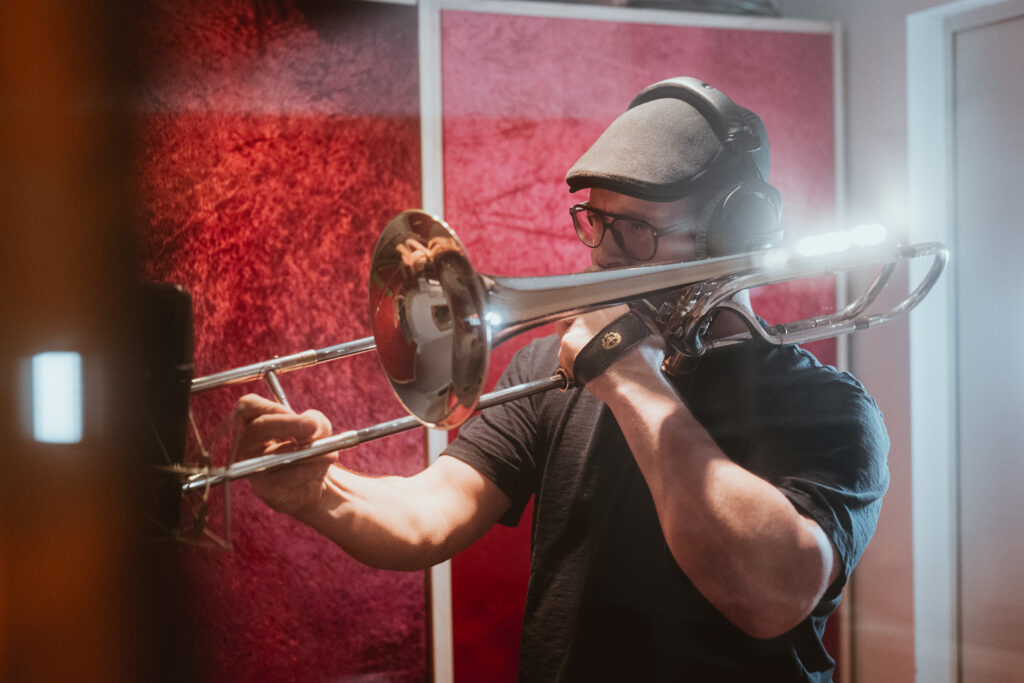

(Cologne, Germany)
All the artists in the project come from a different musical scene, from your point of view, how has the experience been during the process of giving it your personal characteristic and working with the personal characteristics of each artist?
Well, this is a unique experience in a way because before we started this project I’ve never met any of the artists involved, so I had the chance through this project to get to know musically and a little bit personally five new artists who I could become fans of. So, yeah, that has been great from that perspective. Besides, despite the situation that we can’t see each other in person and work together in such a normal way, we’ve at least been able to through internet’s things such as facetime, zoom and skype and typical applications able to meet much like we are meeting with each other right now and though there is naturally something missing from in-person contact we’ve been able to fill in the gaps with all of our creative imagination and make something really nice out of it.
What have you learned from working with musicians from Cuba that you would like to integrate into your work?
Well, I have not personally been to Cuba yet but certainly the Cuban diaspora has been part of my musical life for more than 20 years…I’ve been playing with many fantastic, some of the greatest musicians I’ve met anywhere came originally from Cuba, those in New York that I knew, those in Cleveland, those in Shanghai and those now in Cologne. And it is a hotbed of creativity and discipline in the arts, the schooling there for music is very sincere, very dedicated approach to practice in ways that you develop art as a craft, and so I am always happy to work with musicians that came out from that scene.
For this project, there are many languages involved (German, Spanish and English) but the only common form of communication is music, from this point of view, how has the communication between the team been?
All through my life, I’ve been part of travels and tours in my past and I had a number of instances where I was sitting next to somebody or working with somebody where we couldn’t communicate at all with words but music is, as you were suggesting, a very common language and it defies verbal language. Thankfully we have notation which is a written form that we can all communicate with and otherwise, there are many ways of expressing your ideas about music that don’t need words so I’ve experienced that in the past, and in this case I am fortunate that I have kind of one foot in all three of these worlds, English is easy, Spanish is okay for me and German is getting better and so I’ve used a mix of all three in the course of this project and communicate with the other people that are part of this team, in Spanish when I am talking on the phone with the guys in Cuba and certainly some German when working with Tobi and Kerim, although they defer to me and spoke English with me a lot because they are both really great with English so yeah this project is international and it has to cross these lines in as fluid and natural way as possible and I found we did that.
What has been the biggest challenge of working via web/internet/cellphone?
Well, the combination of internet and restrictions due to covid have caused a lot of delays, I would say that has been hardest thing is that if you are doing everything only virtually it happens a lot slower, you have to, you know, take the time for internet transfers, which are slightly easier here that there are in Cuba, the internet speeds there aren’t what we are used to here so there are a number of instances that I, okay this wasn’t my personal experience but I know that it affected the project from talking to Tobi and Kerim, just sending files back and forward was not even possible due to the bandwidth issues and so how you reduce the size of a file so you can send it. So it’s enough that the job can still be done, so we are not dealing in an ideal situation on any level structurally but artists, I think we are all on the same page that we are used to find solutions and so that’s we’ve done and I think this got solved very well. From everything I’ve heard, I don’t have the most recent last mix of everything but the previous one, the first version I’ve heard of everything already sounded fantastic, I got up from my chair dancing so it’s right.
What would you like to tell the audience to expect from the Dimelo Rapeando project?
For me, this is a super interesting project because it creates a welding, a sort of marriage of a lot of things that don’t typically go together so much, you know, we have jazz, we have electronica in a sort of digit-synthy sort of Nintendo Gameboy sort of sounds and then we suddenly have like deep Cuban grooves and we have rap, we have Son and we have horns and there is a lot of digital elements to it but there is also a breath of real air from human instruments like the trumpet and the trombone. I think that what to expect from this project is probably the unexpected, it’s something in there to please pretty much anybody that likes music.
The interview was conducted on 09.02.2021 via Facetime.
Interview and Transcription: Maria Quirós

(c) Jannis Danikas
Biography
Born in Northern Michigan and musically raised on the diverse scenes of Cleveland, Shanghai anad New York City, Andy Hunter now resides primarily in Cologne, Germany where he performs regularly with the WDR Big Band, with programs featuring many of the top artists in jazz today. Hunter has performed and toured around the world as a regular member of the Mingus Big Band (Mingus Dynasty and Mingus Orchestra), the Richard Bona Group, the Toshiko Akiyoshi/Lew Tabackin Jazz Orchestra, SPOKE, T.S. Monk’s 10-tet “Monk on Monk” and Cuban groups such as Ochún and La Típica Novel.
Recording credits include albums with Snarky Puppy, Bob Mintzer, Orrin Evans’ Captain Black Big Band, The Birdland Big Band,The FatCat Big Band, La Cumbiamba, Hector Martignon’s Banda Grande and the WDR Big Band (albums featuring artists such as Ron Carter, Steps Ahead, Vince Mendoza, Billy Hart and many more). Hunter has also toured briefly with high-profile artists such as Dave Holland’s Big Band, the Spanish Harlem Orchestra, José James, DLG, Nnenna Freelon, Robben Ford, and Ocho y Mas, backing up salsa singers Rubén Blades, Gilberto Santa Rosa, Tito Nieves, La India, Eddie Santiago and Frankie Negrón.
As an educator, Hunter has served on the jazz faculty of Tri-C College in Cleveland and Rutgers University in New Jersey, where his students have been winning prizes and recognition at multiple major festivals. He continues to give clinics and master classes all over the world, and now teaches jazz trombone part-time at Codarts Conservatory in Rotterdam.
Current highlight projects include Europe-based Latin Jazz Quintet Viento Terral and salsa band Marcando.
